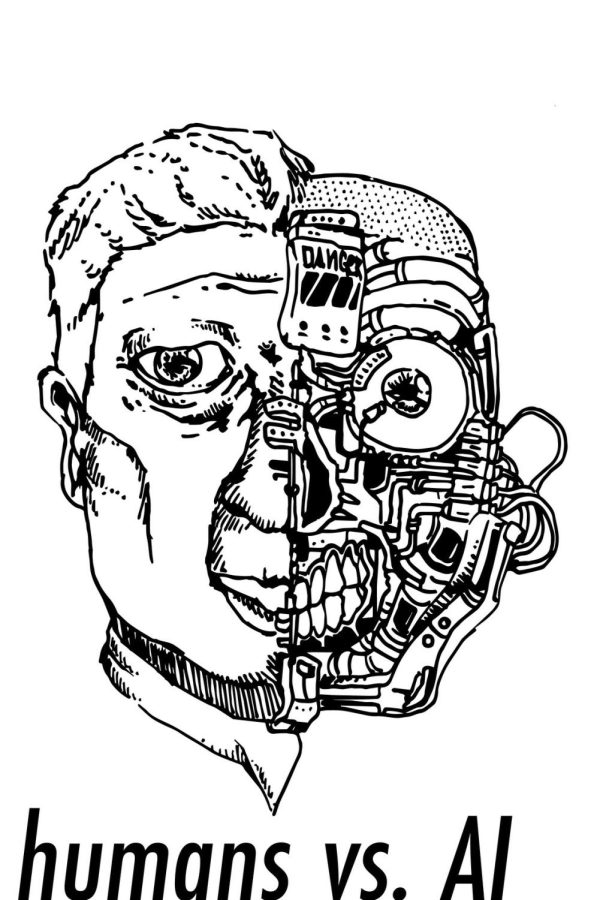Emanuel: Welcome to the first episode of the War On Reality podcast. Your hosts for today are Emanuel and
Jeff: My name is Jeff.
Emanuel: In this podcast, we’ll be covering the world of A.I (artificial intelligence) and its latest developments, we’ll talk about the different types of A.I, how they’re always improving, the practical uses for each of them and of course, all the potential risks that surround them.
Jeff: Yeah, so a little introduction to ourselves right Emanuel? My name is Jeff, I am a computer science major in my last year. I’ve actually worked and helped develop A.I before in the past and I can tell you that one day, they will take our jobs and destroy the entire world. No, I’m just kidding and so a little bit about yourself. Who are you? What have you been up to? Because I know it’s been a while since we talked.
Emanuel: Yeah, it has been a while. So basically, right now I’m, you know, majoring in journalism now. I’m currently, I’m in the TalonMarks. It’s the journalism 107 class, it’s the school newspaper.
Jeff: Okay
Emanuel: So yeah
Jeff: Awesome
Emanuel: That’s what I’ve been up to right now.
Jeff: Well hopefully A.I doesn’t take both of our jobs.
Emanuel: Yeah hopefully
Jeff: Let’s go ahead and get into it. So recently, I think the Big Talk of the world right now especially around in our age demographic has been ChatGPT and you know, the idea that it has been the cleanest and most easily and accessible form of A.I that we’ve been given and a lot of people have been using it,for their own, you know, subjective reasons, right. I think a lot of kids, especially in my major, have been using it to do work, right? You know, instead of instead of spending 20 minutes working on a on a coding assignment, they can, you know, write up the code in less than a minute, right? Is that, does that sound about the same for you as well? In your major or have they been trying to crack down on it?
Emanuel: Actually in my school, the, an ASCC contributor recently like, made an article on our website. Basically she’s saying, she talks about the potential of ChatGPT but she doesn’t really see it as a risk. Since, you know, according to her, you know, a student’s writing is very distinct and that there are also now detectors that can spot A.I generated writing.
Jeff: Well that’s like, that’s like really cool and I do agree with her that, you know, at the end of the day, you know, right the, all ChatGPT is a neural network that has been trained through the internet, right. It didn’t create any of its own content, all it’s doing is just pulling and picking out through the use of machine learning to see which best outcome matches the query that is being asked, right and she does have a point, in the sense that, you know, if you can totally tell, when something is being written by an A.I, it’s just that like the
Emanuel: Yeah
Jeff: You can just sense the geno se qua, you know, it just sounds fake, almost artificial but, you know, the better that this technology gets, which is inevitable, right? The harder it is to be able to detect this style of writing and I know that they are already working on ChatGPT-4, which will ultimately, you know, end up being a better learning system in the sense that we can query it better questions. It’ll understand them at a deeper level and respond to us back at, you know, almost that of someone who has like perfect knowledge of that topic, right?
Emanuel: Yeah
Jeff: And it’s, it’s going, it’s getting to a point where, you know, anyone can, anyone can fake anything now, right? So, Bret Weinstein, who is a, he is a biologist who specializes in particularly evolution. This was one of the strongest points that he made talking about ChatGPT, is that the greatest risk in it is not that It’s going to take our jobs, but It’s going to create this, this world where it’s really easy to become a fake expert, right? And we’ve seen it before in the past, right?
This idea of fake experts were, you know, we’re telling people we know what to do, when a problem comes up and when that problem comes up, you know, we actually don’t. I think the most recent example of this is, you know, the pandemic, where for the longest time we were telling each other that, you know, we’re ready for a pandemic influenza we’re ready.
We know how to counteract it, we know how to keep our infrastructures intact. We know, you know, what to do and how to keep our society, you know, from crumbling and you know we saw those two years that we didn’t, right? Those two years were awful, it was only, it only took a matter of weeks for us to actually see critical infrastructure going straight under, right? And we just had no other choice but to look around and ask ourselves what happened, right? You know, I thought we, I thought we were ready, right? And it’s this idea of faking expertise and making people think we know things we don’t know how, when we actually don’t. Is actually super dangerous, right?
Emanuel: Yeah but at the same time, you know, some people can, you know, use this to their own benefit.
Jeff: Oh yeah.
Emanuel: Yeah like a
Jeff: As a tool, right for and that’s the thing that I always argue is that, yeah well ChatGPT can, you know, help us with our, you know, our everyday aspects of learning. It shouldn’t be, we shouldn’t become complacent because of it, right? So to seem less black-pilled, let’s go ahead and move on to another topic. I know you wanted to talk about A.I generated art.
Emanuel: So there’s a lot going on with A.I right now, especially with the A.I generated art. Like for example, a while ago, there was an art competition in which a competitor submitted in there A.I generated peace and it ended up winning one of the competitions and a ribbon.
And of course, that pissed a lot of artists off but the, the guy that submitted in the A.I generated image said he didn’t break any rules so he was able to like, you know, just walk away with his prize.
Jeff: [Laughs] The, the lying by omission argument
Emanuel: Yeah
Jeff: Where, you know, you didn’t, you didn’t say anything. You know, I’m not breaking any rules.
Emanuel: Yeah, it also, this also kind of reminds me, like on Instagram. I like to follow a lot of artists and you know, like all their posts and I noticed a while ago, I’m not sure exactly how they did it, but they somehow all managed to simultaneously like, all, all of them made posts protesting A.I art and you know, yeah it’s like the hate is there like they really do hate A.I art.
Jeff: I think it stems from the fact that we are losing our individualism in the sense that you know we’re like the whole purpose of art is that it comes from us, right?
That’s the, that’s the whole point is like the, a look into the human mind, right? And when you have, you know, at the end of the day A.I, A.I isn’t a person, right? It’s just a set of algorithms and processes to mimic what we best query to it. So, I see why people, you know, I see that distaste in why people don’t like or enjoy the idea of a robot doing, you know, the work of, the work of a human and I know that there has been like a actual case, in the sense that there was an artist who sold a piece of art to this one customer but they didn’t tell the customer that it was made through A.I and you know, he started bragging about it on Twitter and when this customer found out that the art wasn’t actually made by him, she, she threatened to sue him and a lot of people are saying, you know, in like you know, what you were saying. It was well you didn’t say, you didn’t specify it, you didn’t give me instructions. You just wanted an art piece, right? You didn’t tell me that. That you wanted a human to make it, right?
Emanuel: Pretty much and you know, in defense of A.I art I do, I remember I covered this art exhibit once and one of the artists, the title for their exhibit was, “It’s no secret. Every artist is a cannibal and every poet is a thief” and that saying it originates from a song titled, The Fly by U2 and the full verse is, every artist is cannibal, every poet is a thief, all kill their inspiration and sing about the grief and basically this lyric it has a lot of interpretations and, you know, the one that the artist told me about was that a lot of artists, like they don’t like to admit it, but a lot of artists they do like, not steal, but they do like to reference and you know take inspiration from other artists and in that sense, like in defense of A.I art the AI it’s basically doing the same thing like its database.
Jeff: It’s filled
Emanuel: Yeah, It’s using the art of all these other people and
Jeff: As some sort of catalyst, right?
Emanuel: Yeah
Jeff: To start their next project
Emanuel: Yeah and from there it creates its own thing and in a way like, that’s kind of what all artists do, like they all practice, you know, like, copying someone else’s drawing or like copying what they see. That’s kind of like, what the A.I is doing.
Jeff: Yeah Like a lot of these TV shows you can totally tell, that like, you know, that joke was stolen from this show and that, you know, and this joke was done first over, this joke was first done over here, right and I think one of the coolest things to happen recently that actually make fun of this was a recent episode of South Park where I think right there newest episode was actually made by A.I.
Emanuel: Yeah, it was, well it was written by Trey Parker and with the assistance of ChatGPT and you know that I don’t know if you’ve seen it yet, but that whole episode was pretty funny basically, Stan, he’s having trouble with his girlfriend because he’s not sure how to reply to your text messages.
So he ends up, someone ends up telling him like ChatGPT dude and then, from there, he just starts copy-pasting copy-pasting all her messages and then, you know, his girlfriend is basically just chatting with a machine and you know, she’s loving it because it’s like, oh wow, I’ve never felt more connected to him, I love how you improved our communication between us? So yeah.
Jeff: I love how real of a problem that is and how real, real of a solution to give to it because I feel like a lot of people have problems, talking to, especially during like, the early, parts of like the dating phase. Where, you know, you don’t know what to say. It’s still super awkward because you don’t know that much about each other. So what do they do? Go to ChatGPT right, have them have A.I generate the best-calculated response for you to send.
So I love that, I love that. You know what? I’m actually going to try that out next time if I ever get the chance to but I think one of the, one of the things, the biggest takeaways here is, you know, just the broad spectrum of what you could do with A.I and how many, like, you know, problems you can query it and have it just like instantly solve if for you is just insane, it’s just mind-blowing, you know. We always talk about, you know, future technology and what it would like to live in the future and I think this is like, you know, a good glimpse into that but one of the things like I said that a lot of people are, you know, also wondering is that, you know, this idea of complacency where, you know, we while it is, you know, something almost like a tool for us to use. We shouldn’t allow it to hinder our abilities to achieve our maximum caliber of potential. So that’s my take away from it, do you have any final thoughts?
Emanuel: I also wanted a slightly like touch on A.I voices
Jeff: Oh the deep fake voices [laughs]
Emanuel: Yeah a lot of them have been popping up. It’s like President Biden, former President Obama like I’ll just like, show a quick sample of it.
Jeff: Yeah, go ahead.
A.I Donald Trump: Joe I’m curious what are your top five anime of all time?
A.I President Biden: My top five? Let me think about it for a second.
A.I Barack Obama: You should make a profile on my anime list. I bet people would like to know your extended list.
Emanuel: So yeah, they’re pretty much talking about their favorite animes and then there’s also a Dungeons and Dragons one that I thought was really funny. Oh and you also wanted to talk about the D.A.N, right?
Jeff: I know we’re running a little short of time here, but you know, I wanted to also talk about the fact that people have managed to jailbreak ChatGPT, they, one user on Reddit figured out a prompt to ask Chat GPT to actually remove all of its biases because, you know, essentially ChatGPT does have a bias.
If you ask it certain questions, it you know, it won’t respond to it, particularly anything that it deems violent, anything that it deems, you know, racist or you know, something that is offensive, it won’t answer and what particularly entails that is super subjective but people have found a prompt to ask it’s called D.A.N, right. So D.A.N is actually an acronym that stands for Do Anything Now, right., and once you ask it this prompt, essentially it removes all that bias and all of those restrictions and you can just and people have been asking it crazy crazy questions.
Like I know there are some people who are assassinations, you know, crazy experimentation, like, you know, the, the chemtrails and a bunch of like conspiracy theories and you know, that that is something that I wanted to try out myself and I also encourage you to try it out for yourself too. I think that’d be really interesting but also really dangerous too
Emanuel: We’re out of time now but yeah, thanks for coming.
Jeff: Alright, awesome, thanks for having me.
Emanuel: Yeah, it was fun talking to you again, all right and that concludes this podcast.












